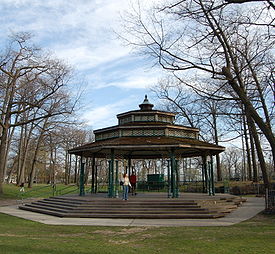| Kew Gardens | |
|---|---|
 The Alex Christie Bandstand The Alex Christie Bandstand | |
 | |
| Type | Public Park |
| Location | Toronto, Ontario, Canada |
| Coordinates | 43°40′07″N 79°17′55″W / 43.668725°N 79.298501°W / 43.668725; -79.298501 |
| Area | 20.7 acres (8.4 ha) |
| Created | 1879 (1879) |
| Operated by | City of Toronto |
| Website | Kew Gardens |
Kew Gardens is a large park in The Beaches neighbourhood of Toronto, Ontario, Canada. The park stretches from Queen Street East to Lake Ontario at Kew Beach.
The park began as a private 20.7-acre (8.4 ha) farm owned by Joseph Williams in the 1850s. As more visitors from the city began to visit the lake front he transformed his holdings into a tourist destination. He set up a large park and built several recreation facilities on the site beginning in 1879, naming it after Kew Gardens in London.
Williams built a substantial house for himself on the site, which still stands and is home to the park's caretaker. On the lakeshore Williams built facilities for swimming and boating. Inland there were picnic areas, trails, tennis courts and lawn bowling. A substantial clubhouse, as well as guest cottages were also constructed. Described by Williams as "A Place of Innocent Amusements," the park was much more genteel than others in the area with no noisy rides or liquor being served. It soon became a popular destination, easily reached from the city via the Queen streetcar.
The park was purchased by the City of Toronto in 1907 for $43,700 and turned into a municipal park. Over the years, the marshland in the south was filled in and the waterfront beach area was redeveloped. Most of the buildings were demolished, as the amusement industry shifted to the much larger Scarboro Beach Amusement Park nearby (located to the east and west of Balmy Beach).
Today the park is one of the main public venues in the Beaches neighbourhood. It is home to a number of facilities including tennis courts, a baseball diamond, a wading pool, and in winter, a skating rink. A number of historic buildings survive, including Williams' cottage, the bandstand, and the Leuty Lifeguard Station (c. 1920). In the northeast corner of the park is the historic Beaches branch of the Toronto Public Library. A number of monuments and memorials are also now located in the park, including the Dr. William D. Young Memorial. It is also the main venue for the Beaches International Jazz Festival each summer. In 2012, the Queen Street Visioning study proposed an interface improvement to the north portion of the park and in 2016 a 17 metre aluminum screen was installed in the space, among other features.
References
- *"Kew Beach/Kew Gardens". Closed Canadian Parks. Retrieved 2012-06-21.
- ^ Cochrane & Cochrane 2009, p. 20.
- Much of the limestone cladding on the former residence of Joseph William's youngest son Kew, the only original structure remaining at Kew Gardens (Toronto), was obtained from the lake bottom at Waupoos Island. Along the Shore: Rediscovering Toronto's Waterfront Heritage. By M. Jane Fairburn, ECW Press, 1 July 2013. Page 148. Accessed June 2020.
- "Kew Gardens". City of Toronto. Archived from the original on 2006-12-02. Retrieved 2012-06-21.
- "Seven-figure park renovations near completion – Beach Metro Community News". Beach Metro Community News. 2017-05-16. Retrieved 2018-11-06.
Bibliography
- Cruikshank, Tom (2003). Old Toronto Houses. photographs by John de Visser. Toronto: Firefly Books. ISBN 9781552977316. OCLC 51922677.
- Cochrane, Glenn; Cochrane, Jean (2009). The Beach : an illustrated history from the lake to Kingston Road. Toronto: ECW Press. ISBN 9781550228717. OCLC 300582517.